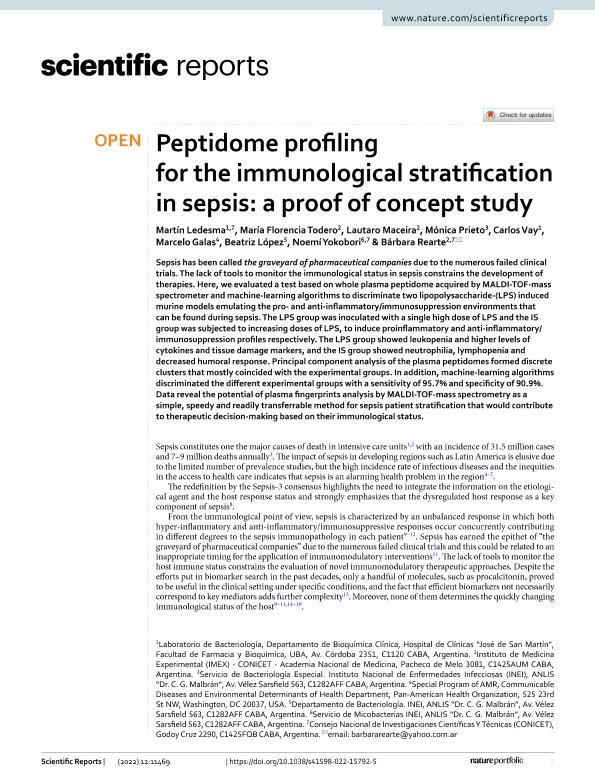Artículo
Peptidome profiling for the immunological stratification in sepsis: a proof of concept study
Ledesma, Martin Manuel ; Todero, Maria Florencia
; Todero, Maria Florencia ; Maceira, Lautaro; Prieto, Monica; Vay, Carlos; Galas, Marcelo Fabián; López, Beatriz; Yokobori, Noemí
; Maceira, Lautaro; Prieto, Monica; Vay, Carlos; Galas, Marcelo Fabián; López, Beatriz; Yokobori, Noemí ; Rearte, María Bárbara
; Rearte, María Bárbara
 ; Todero, Maria Florencia
; Todero, Maria Florencia ; Maceira, Lautaro; Prieto, Monica; Vay, Carlos; Galas, Marcelo Fabián; López, Beatriz; Yokobori, Noemí
; Maceira, Lautaro; Prieto, Monica; Vay, Carlos; Galas, Marcelo Fabián; López, Beatriz; Yokobori, Noemí ; Rearte, María Bárbara
; Rearte, María Bárbara
Fecha de publicación:
06/07/2022
Editorial:
Nature Publishing Group
Revista:
Scientific Reports
ISSN:
2045-2322
e-ISSN:
2045-2322
Idioma:
Inglés
Tipo de recurso:
Artículo publicado
Clasificación temática:
Resumen
Sepsis has been called the graveyard of pharmaceutical companies due to the numerous failed clinical trials. The lack of tools to monitor the immunological status in sepsis constrains the development of therapies. Here, we evaluated a test based on whole plasma peptidome acquired by MALDI-TOF-mass spectrometer and machine-learning algorithms to discriminate two lipopolysaccharide-(LPS) induced murine models emulating the pro- and anti-inflammatory/immunosuppression environments that can be found during sepsis. The LPS group was inoculated with a single high dose of LPS and the IS group was subjected to increasing doses of LPS, to induce proinflammatory and anti-inflammatory/immunosuppression profiles respectively. The LPS group showed leukopenia and higher levels of cytokines and tissue damage markers, and the IS group showed neutrophilia, lymphopenia and decreased humoral response. Principal component analysis of the plasma peptidomes formed discrete clusters that mostly coincided with the experimental groups. In addition, machine-learning algorithms discriminated the different experimental groups with a sensitivity of 95.7% and specificity of 90.9%. Data reveal the potential of plasma fingerprints analysis by MALDI-TOF-mass spectrometry as a simple, speedy and readily transferrable method for sepsis patient stratification that would contribute to therapeutic decision-making based on their immunological status.
Palabras clave:
MALDI-TOF
,
Sepsis
,
Peptidome
Archivos asociados
Licencia
Identificadores
Colecciones
Articulos(SEDE CENTRAL)
Articulos de SEDE CENTRAL
Articulos de SEDE CENTRAL
Citación
Ledesma, Martin Manuel; Todero, Maria Florencia; Maceira, Lautaro; Prieto, Monica; Vay, Carlos; et al.; Peptidome profiling for the immunological stratification in sepsis: a proof of concept study; Nature Publishing Group; Scientific Reports; 12; 1; 6-7-2022; 1-8
Compartir
Altmétricas



